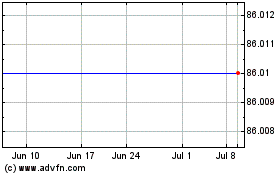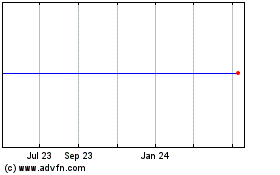Raytheon, United Technologies in Talks to Merge - 3rd Update
June 09 2019 - 10:22AM
Dow Jones News
By Cara Lombardo
United Technologies Corp. is near a deal to combine with
military contractor Raytheon Co., according to people familiar with
the matter, the latest move by the sprawling conglomerate to
transform into a company focused on aerospace and defense.
The companies, which together have a market value of roughly
$166 billion, could announce a deal in the coming days assuming
talks don't fall apart at the last minute, the person said.
Exact terms couldn't be learned but United Technologies
shareholders are likely to own a majority of the combined
company.
The tie-up, expected to be billed as a merger-of-equals,
wouldn't affect United Technologies' existing plans to spin off its
Otis elevator and Carrier building-systems businesses into separate
companies. Raytheon would be combining with United's remaining
aerospace business, and all transactions would take place at the
same time. United Technologies has said the spinoffs will take
place in the first half of next year.
Adjusting for the spinoffs, the companies' combined market value
would likely still be north of $100 billion. The new entity would
be the world's second-largest aerospace-and-defense company by
sales after Boeing Co., with annual revenue of more than $70
billion last year.
In addition to other benefits from increased scale, the proposed
deal could help the enlarged company weather any slowdown in the
commercial aerospace and defense markets.
United Technologies Chairman and Chief Executive Greg Hayes is
expected to lead the combined company, while Raytheon Chairman and
CEO Thomas Kennedy would be chairman, the person said.
United Technologies has a market value of roughly $114 billion,
while Raytheon's is about $52 billion.
The deal would be one of the largest in a year that has included
some big mergers but otherwise has been lackluster. Right now the
biggest proposed acquisition is Bristol-Myers Squibb Co.'s $74
billion purchase of rival drugmaker Celgene Corp.
A United Technologies-Raytheon combination has long been
speculated on by analysts and investors, given that the two
companies operate in mainly different segments and could benefit
from sharing technology.
It would unite the maker of Pratt & Whitney engines -- used
on commercial airliners such as the Airbus SE A320neo -- and the
F-35 combat jet, with Raytheon, the fourth-largest U.S. defense
contractor by revenue.
Farmington, Conn.-based United Technologies, which acquired
Rockwell Collins for $23 billion late last year, is one of
America's last remaining big industrial conglomerates -- though it
is set to radically transform with the spinoffs and now the
merger.
The Otis elevator division and Carrier building-systems
businesses will become separate publicly traded companies, leaving
United Technologies as a pure-play aerospace company. The rationale
for the split was clear in the company's first-quarter results as
the aerospace portions of its business posted strong growth.
Investors are pressuring traditional conglomerates to become
more focused. Rivals Honeywell International Inc. and General
Electric Co. are both shaving off units to streamline their
businesses.
Several activist investors had pushed United Technologies to
split, and Mr. Hayes has openly expressed his preference for
smaller, more focused companies. Before the Rockwell deal, the
company's revenue was about evenly split between airplanes and
buildings.
Waltham, Mass.-based Raytheon, whose sales rose 6.7% last year
to $27.1 billion, produces missiles such as the Tomahawk together
with radars and other electronic-warfare systems. It has invested
heavily in recent years ahead of the recent uptick in Pentagon
spending, and has the biggest export business among the five
largest U.S. defense contractors.
While commercial aircraft sales have been booming during an
unprecedented 13-year surge in orders that has left Airbus and
Boeing with backlogs of more than 13,000 jetliners, analysts have
cautioned that slowing air traffic could force aircraft makers to
reverse production increases.
The two-year uptick in Pentagon spending on new aircraft,
missiles and other defense equipment is also running out of steam,
with analysts projecting muted growth over the next several
years.
The U.S. defense industry has morphed from about 60 big
companies at the start of the 1980s to only five prime contractors
today. Pentagon leaders have indicated they wouldn't allow further
mergers between the main players -- Lockheed Martin Corp., Boeing,
Northrop Grumman Corp., General Dynamics and Raytheon.
However, combining United Technologies' aerospace assets with
Raytheon is likely to attract less scrutiny given that the
companies have almost no overlap in their defense businesses.
Thomas Gryta and Doug Cameron contributed to this article.
Write to Cara Lombardo at cara.lombardo@wsj.com
(END) Dow Jones Newswires
June 09, 2019 10:07 ET (14:07 GMT)
Copyright (c) 2019 Dow Jones & Company, Inc.
United Technologies (NYSE:UTX)
Historical Stock Chart
From Mar 2024 to Apr 2024

United Technologies (NYSE:UTX)
Historical Stock Chart
From Apr 2023 to Apr 2024
